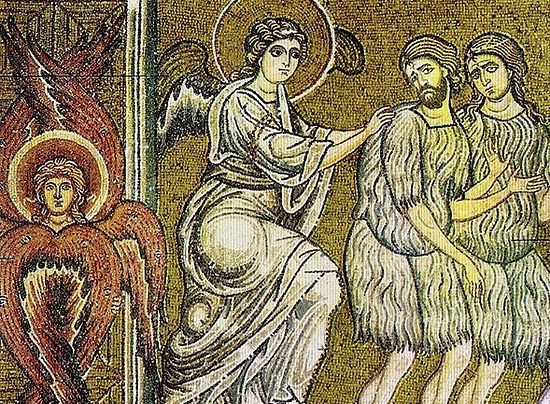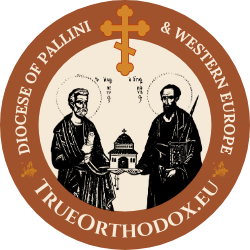Forgiveness Sunday: A Word in Remembrance of Adam’s Expulsion From Paradise – Sermon of our First Hierarch -Unofficial Translation

By His Eminence, Archbishop Tikhon of Omsk and Siberia: First Hierarch of the Russian True Orthodox Church
“If ye forgive men their transgressions, your heavenly Father will also forgive you; but if
ye forgive not men their transgressions, neither will your Father forgive your
transgressions. And whenever ye are fasting, cease being as the hypocrites, of a sad
countenance; for they artificially disfigure their faces, in such a manner that they might
appear to men fasting. Verily I say to you that they have their reward. But thou, when
thou fastest, anoint thy head and wash thy face, so that thou mightest not appear to men
fasting, but to thy Father Who is in secret; and thy Father, Who seeth in secret, shall
reward thee in the open. Cease treasuring up for yourselves treasures upon the earth,
where moth and rust doth destroy, and where thieves dig through and steal; but be
treasuring up for yourselves treasures in heaven, where neither moth nor rust doth spoil,
and where thieves do not dig through nor steal. For where your treasure is, there will your
heart be also.” (Matthew 6:14-21)
In the name of the Father, and of the Son, and of the Holy Spirit!
As of tomorrow, we begin the journey of Great Lent, and the Holy Church admonishes us
with the Gospel commandment of reconciliation with our neighbors, of forgiveness and
remission of all their trespasses before us. “If ye forgive men their transgressions, your
heavenly Father will also forgive you,” says the Lord himself in today’s Gospel, “but if ye
forgive not men their transgressions, neither will your Father forgive your
transgressions.” This is the first and necessary condition for our reconciliation with God,
for our purification and justification from sin.
Without this heartfelt reconciliation with all, without this forgiveness of mutual distress and
enmity, it is impossible to come to the Lord, nor is it possible to begin the very journey of
fasting and repentance. Why? Because, first, the Lord our God Himself is the God of peace,
not of disorder.
Secondly, because the kingdom of God is a society of the sons of God, and is a kingdom of
peace, love, and unanimity, mercy, meekness, and humility; can he belong to it who harbors
in his heart grief, annoyance, and malice toward his brother, who has not unanimity and
peace with his fellow heirs of the kingdom? Peace is the highest good, which the Lord Jesus
Christ bequeathed as a precious inheritance to His disciples when He departed from them
to suffer: “Peace I leave to you, My peace I give to you” (John 14:27). Peace is the supreme
happiness that He first of all gave to His friends, welcoming them after His resurrection
from the dead, standing in their midst and saying to them: “Peace be with you!” Those who
deprive themselves of this spiritual treasure, the peace of Christ, by enmity and rancor,
deprive themselves of the kingdom of God as an eternal inheritance, which the Lord has
bequeathed to those who love Him.
Peace is a gracious gift of the Holy Spirit, and therefore the presence or absence of it in a
person’s heart testifies to the one who dwells in it: Whether the spirit of God or the spirit of
the evil one, which is predominantly a spirit of malice and enmity, and therefore that man
who harbors malice and ill-will toward his brother, his place is not in the kingdom of peace,
but with all the spirits of the rejected. Obviously, without a sincere heartfelt reconciliation
with all our brothers in Christ, the gracious procession of holy fasting will pass fruitlessly for
us, even if we try to conduct the fast according to the rules of the Church’s Charter. What
good will it do to fast when, by strictly abstaining from bodily food, we eat up the souls and
hearts of our neighbors with our anger and stubbornness; when, fearing to defile the mouth
with some forbidden food, we are not afraid, however, that from these lips there continues
to emanate like a foul stench – words of condemnation, slander and backbiting, stinging
mockery, full of seduction of the soul. Not only fasting, but also martyrdom will not replace
true love for one’s neighbor, that love that is longsuffering, merciful, does not envy, does not
boast, is not proud, does not rage, does not get irritated, does not think evil, but loves
everyone and endures everything.
When we stand in prayer, we must forgive if we have anything against anyone, so that our
heavenly Father may also forgive us our trespasses. Otherwise, what good is prayer, when
outwardly we humble ourselves, calling ourselves last, but inwardly we speak like the
Pharisee: “I am not as the rest of men—rapacious, unjust, adulterers, or even as this one,
the tax collector” (Luke 18:11); when we say the prayer of St. Ephraim the Syrian with our
lips: “Grant me, O Lord, that I may see my sins and not condemn my brother,” but in
practice we make ourselves the unforgiving judges of everyone and everything, noticing the
speck in our brother’s eye, without noticing the beam in our own eye? The Lord spoke of
such men who pray long ago through the prophet: “And the Lord has said, This people
draw nigh to me with their mouth, and they honour me with their lips, but their heart is
far from me: but in vain do they worship me” (Isaiah 29:13). And He Himself in His Holy
Gospel said: “Not everyone who saith to Me, ‘Lord, Lord,’ shall enter into the kingdom of
the heavens, but the one who doeth the will of My Father in the heavens” (Matthew 7:21).
Let us remember that fasting does not permit vindictiveness. And those who collect in their
memory their sorrows and the evil done to them, though apparently praying and fasting, are
like people who draw water and pour it into a leaky barrel. The Lord does not accept prayer
from one who remembers evil against his brother.
Our restless heart not only undermines our prayer, it also makes our repentance fruitless.
What good is repentance if we repent with our lips but harbor malice and vengeance in our
hearts? Whoever wants his repentance to be accepted as a favorable sacrifice to God must
forgive his neighbor’s sins wholeheartedly, so that he will not remember them. Without this,
no matter how much the confessor allows us in confession, our spirit bound by enmity will
not be resolved and the Heavenly Father will not forgive us our sin.
The Lord says, “If, then, thou offerest thy gift on the altar, and there rememberest that thy
brother hath something against thee, leave there thy gift before the altar, and go thy way.
First be reconciled to thy brother, and then come and offer thy gift” (Matthew 5:23-24). If
we dare to proceed to the Sacrament of Holy Communion, the Sacrifice which was offered
primarily for the love of God’s only Son for the human race, without true love for one
another, it would be an insult to the highest love of God. Having a spirit of malice,
vengeance, and enmity towards our neighbors, we trample on the Holy Things, and the
blood of the Lord is counted for nothing.
Dear brothers and sisters, the ancient Christians had a good and pious custom on
Forgiveness Sunday to ask forgiveness from one another. Let us also follow this good
custom at the call of our mother Church and ask forgiveness from one another, especially
from those whom we have offended in any way. Due to the weakness of our nature, due to
the circumstances of life in our conditions, collisions and grief are inevitable, and therefore
we will try to soften our souls and mutual relations through mutual forgiveness.
Let us forgive everyone with all our heart and with a reconciled heart let us enter the field of
holy fasting, asking the Lord for forgiveness of our sins. At the same time, let us always
remember the words of the holy Apostle Paul: “If possible, as to that which depends on you,
be at peace with all men… and the God of love and peace shall be with you” (Romans 12:18,
II Corinthians 13:11), and if the Lord is with us, then what more could we wish for?
Amen.





